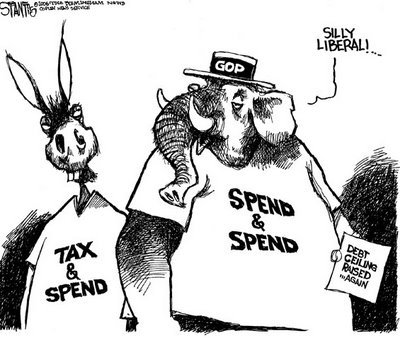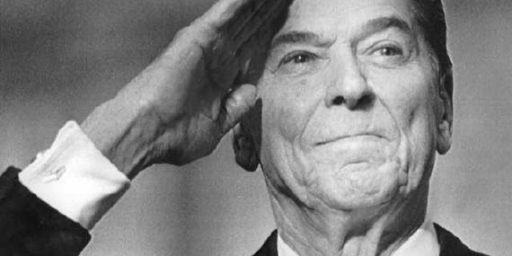Tax and Spent vs. Tax Cut and Spend
 Steve Bainbridge thinks that “a high tax Democrat win in 2008 might have positive long-term strategic gains.” Specifically, it would that remind Americans that “Democrats are tax and spenders not tax and savers” and could lead to the sort of backlash that brought Ronald Reagan to power in 1980.
Steve Bainbridge thinks that “a high tax Democrat win in 2008 might have positive long-term strategic gains.” Specifically, it would that remind Americans that “Democrats are tax and spenders not tax and savers” and could lead to the sort of backlash that brought Ronald Reagan to power in 1980.
There’s one little problem with that thesis: The Republicans haven’t exactly shown a propensity to cut spending, either. The sainted Ronald Reagan himself, granted with the assistance of a Democratic House, raised the deficit to record heights. George W. Bush, with the full cooperation of a Republican Congress for six years, spent like a drunken sailor.
Unless the backlash is powerful, indeed, it doesn’t look like fiscal restraint is among the options. The argument that “Democrats will spend even more!” is rather unsatisfying, although it has the advantage of being unfalsifiable. What’s left, I suppose, is a vagues sense that Republicans will at least over-spend on the right things.
Cartoon credit: The Big Picture.






I hope that someday, somehow people of both parties will realize that neither party has fiscal responsibility as a bedrock, core value. It’s mostly just a campaign slogan trotted out at election time.
Democrats and Republican differ mostly in how they think the dough should be spent not on whether the size of government should be increased.
BTW it’s nice that Professor Bainbridge has decided to make lemonade but let’s get down to brass tacks: winning is always better than losing. If it weren’t nobody would ever try to win.
People care a whole lot more about the taxes they pay than the federal deficit. I don’t think elections are won or lost on deficits, in fact 1984 and 2000 would be excellent counter examples.
“Democrats and Republican differ mostly in how they think the dough should be spent…”
Well, actually there is one other difference. Democrats tend to think that current taxpayers should pay for the spending, whereas Republicans think that future generations should pay for our spending, with interest.
Tano, I look forward to your making the case that the Democratic Party is the party of fiscal responsibility. Start in 1946 and move forward. Democrats controlled the House for 40 years from the 1950’s into the 1990’s.
No doubt you’ll point to the magnitude of the debt created by the Republican Congress after they took control with the Gingrich Revolution. Republicans will point to debt as a percentage of GDP. I say: pfui.
Look, my point is not that Republicans are better than Democrats in any respect whatever. It is that neither party has a sterling track record of fiscal responsibility. That’s simply undeniable.
Dave,
I am not claiming that either party has a sterling record. Nonetheless, there are differences. I would point to the Reagan quadrupuling of the national debt, and, on a smaller scale, the increase under 43.
The basic fact here is that a growing robust economy needs a certain level of government involvement – in terms of regulation (policing the marketplace), investment in social goods that are not necessarily profitable in the timelines of the private markets, and transfer payments to those who, for a variety of reasons, are not competitive in the modern economy.
Of course the size of this government involvement can be and is argued over – but the parameters of the real debate are much narrower than what is characterized in political rhetoric. And the extremist, almost absurd rhetoric is mostly on the right.
No one on the left is arguing for totalitarianism, or for any other massive increase in government involvement. But the “drown the government in a bathtub” crowd is enormously influential on the right, and seem to be driving the rhetoric there.
When it comes to paying for whatever level of government that we do have, then once again, it seems to me, that the absurd extremist rhetoric is mostly on the right. Democrats tend to at least play with the idea of raising taxes to balance the budget and /or pay for whatever new programs they propose. But Republicans have one simple line – tax cuts, and they trot that our irresepctive of what their spending habits and proposals may be.
They have even erected an entire economic philosophy of snake-oilism, in which cutting taxes can, in and of itself, raise sufficient revenues to balance the budget and pay for whatever we want to spend on. Reagan, of course, campaigned on just that promise. And even when the result turned out to be a quadrupuling of the national debt – even when the Clinton tax cuts brought in more revenue rather than less (as supplyside predicts) – even when Bush cuts led to deficits once again – the right continues to try to sell this snakeoil.
Yeah, there are no angels here, but I find it very hard to escape the conclusion that the right has been massivly more irresponsible in their rhetoric and in their policies on this issue.
While I agree that neither party has been good on fiscal responsibility, the American voter has generally rewarded drucken spenders like Byrd and Murtha. So one must ask who really is acting irresponsible? We claim voters are angry and demand responsible spending but history suggests voters want the pork brought back to the district.
The parties’ values are whatever we tell them we will vote for. So neither party is practicing fiscal responsibility because the irresponsible voters aren’t demanding it.
Same basic point as above. I guess this isn’t surprising when we live in a country full of people who are surprised when ARMs went up from 40-year lows. It is as if I opened my credit card bill every month, saw rows and rows of charges from jewelry and clothing stores, and looked at my wife and said, “Honey, we really need to lower our minimum payment to this credit card company!” Unless you are old, Bush didn’t cut taxes, he deferred them. And if you are young, he raised them. Whether the Republicans or Democrats running for office in 2008 and beyond will do any better depends on whether the voters demand that they do.
It ain’t that simple. In November of 2008 you’ll have a choice between a fiscally irresponsible Democrat and a fiscally irresponsible Republican. One of them will become president.
oops, I meant “clinton tax increases” in my post above.
Yes, at least in the long run I think it is that simple. The reason the parties will nominate fiscal irresponsibility is because that is what the voters have (effectively) asked for. There is always so much whining about the “parties” and “politicians,” and I grant that there is a serious problem with the role of big money in politics that distorts the will of the people. But the biggest fact in American democracy is that “We Have Met The Enemy and He Is Us.”
Tano,
A few thoughts:
A large part of the deficit under Reagan was the large increase in defense spending. Reagan felt it was necessary to defeat the Soviets. When the Soviets in fact were defeated it became reasonable to reduce defense spending. When we were attacked on 9/11 we had to increase spending once again. While this doesn’t explain everything it is a very large chunk of the deficit/surplus.
Also recall Greenspan’s remarks on the surplus in 2000. We were going to retire all outstanding debt and need to have the government enter the stock market to invest the surplus. Those comments differed greatly from Greenspan worrying about the deficit in 1994 – 1996. The source of the unexpected funds were primarily capital gains, which rates had been cut.
Bush to his credit attempted SS reform. Politicians from both parties (and U.S. citizens for that matter) ran away. Is there a more ridiculous concept than a defined benefit pension plan lacking any real assets that transfers assets from the relatively low net worth young to the relatively high net worth old?
Another factor in the surplus in the late 90’s was the massive capital gains from companies that ceased to exist shortly there after (Commerce One, WebVan, Pets.com, Worldcom, etc.), or dropped dramatically in value (Cisco, Oracle, GE, etc.). Additionally, many companies paid corporate taxes from 1998 – 2000 on profits later written off resulting in loss carry-backs and carry-forwards. A Zach’s study in 2004 found after accounting for these write-offs there were ultimately no earnings for the combined Nasdaq companies between 1998 – 2000.
Finally, if the drown the government in the bathtub crowd has such influence among Republicans, how when they controlled all branches of government were they such utter failures?
More importantly, the House was controlled by Democrats.
C.W,
On discussion such as this, it would be helpful to provide at least some top-level numbers, rather than merely the claim that defense spending represented a “large chunk” of the deficits.
I dont have time to do the reserach now, but as a first pass, looking at the increase in the defense budget during the Reagan years, compared to the increase in the non-defense discretionay spending, it looks to me that the Reagan defense policy led to an extra trillion dollars of expense, over and above what we would have spent had defense merely increased at the same rate as non-defense discretionary spending.
But the increase in the national debt was something like 6 trillion.
I would appreciate some better numbers – and I assume you must have them.
The Greenspan position was rather silly, of course. Paying the debt down to zero was not an immediate concern, and one could always have instituted targeted tax cuts that would have only kicked in once the debt was zero. Or even just rebated any collected tax once that point was reached.
Niether I, nor the great majority of Americans think that SS is ridiculous. Not sure what that issue has to do with this discussion though…
Tano,
Given your 6 trillion figure I might not understand what your saying/asking. But during Reagan’s years (if that’s what you’re asking me to respond to) the national debt went from 1.1 to 2.3 trillion. I believe your defense calculation during those years is roughly correct, leaving .2 trillion in increased non-defense spending.
My SS comment is due to the fact that entitlements completely overwhelm current deficit spending. The current 150 billion dollar deficit is not a particularly serious matter and is low both historically and versus developed nations.
Actually, it is serious, given that we should currently be raising massive, massive surpluses in the final and most lucrative earning years of the baby boom generation for their Medicare and SS. A $150 billion “surplus” this year would be a deficit in my book, unless we have the courage to tell the baby boomers that we are sorry but that they already spent their entitlement money on spending programs they didn’t pay for.
But certainly not exclusively. The difference really just boils down to a spending see-saw between health care and the military.
Paul,
I agree and that was the point I was trying to make. Entitlements are the problem. If we merely had a $150B deficit it wouldn’t be a big deal.
The ultimate solution will be found when enough “eat our young” baby boomers die and the current 20 to 30 year old cut them off. Bush’s solution, while partial, is considerably superior.
I’m a tail end baby boomer and expect nothing from SS. I would much prefer a flow of money from the old to the young (where it has greater value). Think of the difference in value of a college education to a 25 year old versus a 65 year old or $5,000 in investments for either. This happens somewhat do to progressive taxes, but is reversed a bit by entitlements.